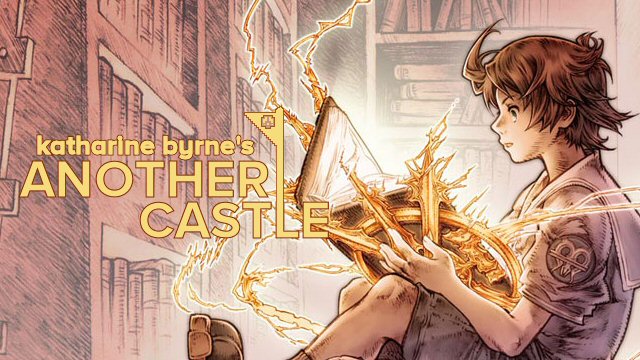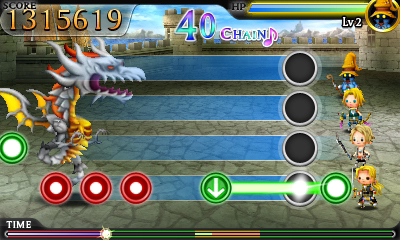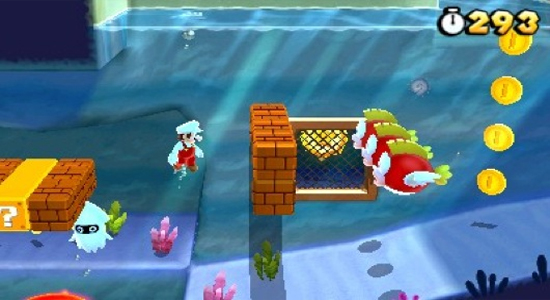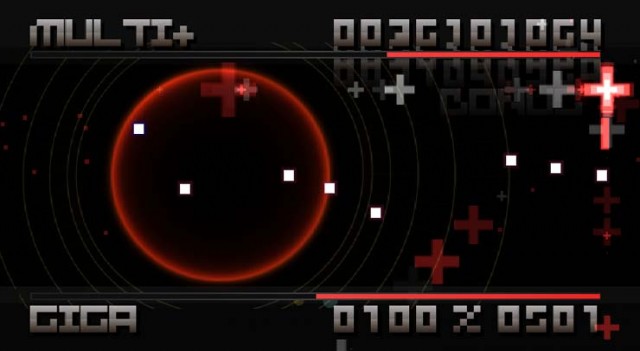
I know I talk a lot about stories in games here at Nintendojo. Ever since mid-January, I’ve been exploring how richer narratives can make for deeper gaming experiences, whether it’s discussing the minute detail of Dante’s Inferno in Resident Evil: Revelations, or talking about how the utopian themes in The Legend of Zelda: Skyward Sword attempt to tap into the wider discussion about how we should organise ourselves and our own societies. I’ve written about love and religion, the end of the world and the end of games, and I’ve also talked about wider narrative issues like character empathy and story delivery. But there’s one thing that’s been bothering me over the past two weeks, and it’s once again been inspired by a rather prolonged exposure to Theatrhythm Final Fantasy.
As Bradly mentioned in his review a few weeks ago, Theatrhythm‘s a slightly odd kind of Final Fantasy title in that it really doesn’t have much of a story compared to the games it actually celebrates. It’s pretty standard Final Fantasy fare when you get right down to it– Chaos’s dark forces have been disrupting the world’s Rhythm, which in turn has dimmed the light of the Music Crystal (the force that fills the world with harmony), and only the thing that can restore the Crystal to its former radiance is Rhythmia, “the musical wavelength filling all space”. Enter your trusty band of heroes and voila, that’s Theatrhythm’s story in a nutshell– I’m not even kidding. It’s so tenuous and ridiculous it’s almost quite funny. The thing is, though, none of that really matters, and that’s what’s been bugging me. It may be a glorified nostalgia trip at the end of the day, but not once have I thought, “You know what? Theatrhythm’s story really stinks. I wish it was better.” It might sound like blasphemy coming from someone like me, but I’m going to say it anyway: I don’t care about Theatrhythm’s story, and I don’t think it’s important to one’s enjoyment of the game.

It’s great when your characters finally take down a boss monster, but getting a Perfect Chain on Ultimate difficulty is way more satisfying.
It may sound obvious, but for me, the primary pleasure of playing a game like Theatrhythm is precisely that– playing the game. Mastering the gameplay mechanics and hitting all the right notes is what drives me forward, and it’s also what keeps me coming back too. In a way, the “story” of Theatrhythm is what happens every time you turn it on. It’s scraping through an intense battle by the skin of your HP bar; it’s watching your characters stumble in the field when you hit a wrong note; and it’s discovering Dark Note after Dark Note in the Chaos Shrine. It’s moments like these, the minute-by-minute events of the game itself, that give it meaning– not some grand, overarching narrative about saving the world and whatnot– and I just don’t think it needs a big story to help define it. Instead, its strengths lie in encapsulating the pure joy of play, not to mention its gentle tongue-in-cheek humour, and as far as I’m concerned, it really doesn’t need much more than that in order to be a great game.
The same can be said for other games like Donkey Kong Country Returns and Super Mario 3D Land as well (or indeed any type of Mario game for that matter). The joy of those games, I find, is in finally conquering that wretched mine-cart level or accidentally stumbling upon a hidden star medal, not trying to grapple with some wider narrative about Bowser’s ongoing relationship with Peach or why Donkey Kong seems to hold the entire island’s supply of bananas to ransom. They’re about exploration, bending boundaries and testing your own prowess, and I don’t think there are many things more satisfying than finally pulling off a tricky double-jump/back-flip/assorted move and uncovering one of the game’s many secrets. It’s not just me who thinks this way either. In a recent interview with Edge Magazine, for example, Koichi Hayashida, the director of Super Mario 3D Land, said that the main aim of Mario’s first 3DS outing was “to create an easy entry point into the 3D Mario series for absolutely anyone who was interested in it but felt that maybe it might not have been for them previously,” and he made particular note of the star medals:
“One thing that occurred to us was that [beginner] players might have trouble getting all of the Star Medals. The Star Medals were in the game mostly as a reward for exploring, and that’s something that I think speaks to advanced players more than beginners– or if not advanced players, at least those people who were willing to practise getting to certain areas of the game many, many times.”
It’s these kinds of “rewards”, as Hayashida puts it, that are far more important to a game like Super Mario 3D Land than any kind of deep narrative, and given that Mario games in particular tend to pay so little attention to their plots anyway, it would seem that Nintendo themselves don’t think it’s very important either.

It’s often the star medals lying in plain sight that are the trickiest to get to as well…
But if stories are generally so unimportant when it comes to these types of games, part of me wonders why they bother having one at all. They may be the most ridiculous and hackneyed plots we’ve ever seen, but they’re still plots, after all, so why can’t these games just let go of stories altogether? Do I really need to be told my princess is in another castle or that I have to collect something as silly and contrived as Rhythmia in order to relight a Music Crystal? Probably not.
In fact, I think I’ve only ever played a handful games in my entire life that are completely narrative-free, and those are Tetris, Alleyway, indie games Swift*Stitch and Proteus, and maybe Nintendogs. As I’m sure you all know, the first two are solely about “the game” of trying to make rows of blocks disappear, whereas Swift*Stitch involves trying to navigate a bunch of puzzles without crashing into a wall. Meanwhile, Proteus is a bit like Minecraft but without the craft part (or the mining, for that matter), and Nintendogs is, well, you know, Nintendogs.
That’s not to say those are the only narrative-free games in existence, but every other game I’ve played over my twenty-odd years of gaming has had a story attached to it– even the Bit.TRIP series, even though they too are ostensibly about nothing more than the purity of their respective “games”. This may have passed you by if you didn’t pick up Bit.TRIP Complete, but hidden away in this compilation pack are six letters written by the developers themselves describing the plot and symbolism of each game. I haven’t managed to unlock the first three letters for Beat, Core and Void yet, but here’s a taster of what’s in Runner‘s letter:
“CommanderVideo has now made the transition into his physical form; he’s mastered his mind and has a grasp of what it’s like to live among other beings. […] Impetus [the first stage] introduces players to CommanderVideo’s insatiable urge to challenge himself and grow. […] In Tenacity [the second stage], where it seems like everything’s against him, he has to push harder to succeed. […] Soon after Tenacity, CommanderVideo experiences the waste and ugliness of the world first-hand.”
Fate, on the other hand, is about coming to terms with death. As CommanderVideo is “constantly bombarded by negativity and hatred”, each level represents his ever-decreasing emotional state as he fights against all the evil and sorrow in the world: he starts off determined, but his optimism soon turns to patience, desperation, frustration and then anger before he’s finally overwhelmed and falls. The final game in the series, Flux, brings this journey full-circle, revisiting the familiar gameplay of Beat to allow CommanderVideo to let go of his previous experiences and return home transcendent. That’s an incredibly brief version of last three letters, but hopefully you’ve got the gist!

Yep, even this has a story.
So why is this? Why can’t the majority of games just let go of stories altogether? Part of it, I think, is that we often need a reason to start playing, no matter how trite or unoriginal, and it all stems back to that tried and tested concept of narrative desire (I promise I’ll stop talking about it some day!). We may groan at the thought of having to rescue Princess Peach for the twenty-fifth time in as many years, but her absence (or indeed any other type of absence, from bananas to rhythmia) is precisely what makes us go out and start playing, kickstarting the plot into action and propelling us forward through the game.
In a similar vein, stories can also give us a bit of context. I don’t think jumping into all those paintings in Super Mario 64 or running round planetoids in Super Mario Galaxy would have made half as much sense if Mario had just been put there without rhyme or reason, so even though each plot may not be very significant at the end of the day, they’re still important in helping us understand the world around us. In turn, they also give us a framework for all those inevitable rewards and discoveries we’re going to uncover, allowing us to make sense of them in relation to what’s going on elsewhere in the game. If they do nothing else, they at least help us to chart our progress, giving us our bearings when it comes to working out whether we’re near the beginning, middle or the end, because if we put aside characters and story for a moment, that’s essentially what a narrative is at its most basic level– a simple means of helping us to understand time and change by putting events in a certain order.
It’s for these two reasons, then, that I don’t think I can stop caring about stories altogether. No matter what you think about their importance to gaming, it would seem that the vast majority of games just can’t do without them. Of course, not every game has to have a story rivalling those of JRPGs or action-adventure games like Zelda and Ōkami— that would be ridiculous– but they do matter. They may take different forms and they may set out to achieve different goals, but I think there’s room for all sorts of different kinds of story-telling in video games because ultimately I think the most important thing a story can do for a game is to make us feel something (and I’ll eat my stylus if anyone tells me that the sheer delight of scoring a Perfect Chain in Theatrhythm or leaping through space in Super Mario Galaxy is any less meaningful than the gut-wrenching tragedy you find in games like Xenoblade Chronicles and Pandora’s Tower). It’s all well and good revelling in big, pre-ordained plot points, but if we can’t find the same kind of meaning in our own achievements, then I think something’s gone seriously wrong in our pursuit of a good story.




 ShareThis
ShareThis







katharine i think you discovered what miyamoto san thinks about stories in videogmaes, the good thing is that now you can cherish both kinds of games, story-driven games and nonsensical or primitive story games like mario and theatiryth ( i dont know how to spell that freaking name). I’m on the miyamoto side, i prefer games with little story and more gameplay focused. Or games with simple yet effective stories, like ico or ocarina of time.